高中英语高考语法专题解析12 特殊句式省略
- 格式:doc
- 大小:26.38 KB
- 文档页数:4
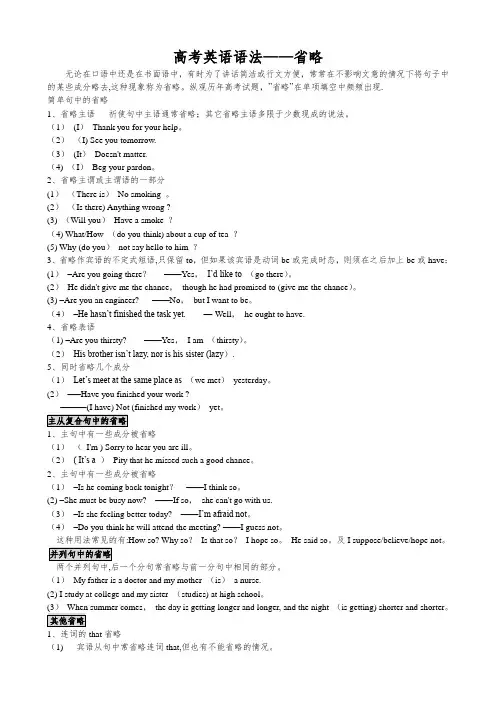
高考英语语法——省略无论在口语中还是在书面语中,有时为了讲话简洁或行文方便,常常在不影响文意的情况下将句子中的某些成分略去,这种现象称为省略。
纵观历年高考试题,”省略”在单项填空中频频出现.简单句中的省略1、省略主语祈使句中主语通常省略;其它省略主语多限于少数现成的说法。
(1)(I)Thank you for your help。
(2)(I) See you tomorrow.(3)(It)Doesn't matter.(4) (I)Beg your pardon。
2、省略主谓或主谓语的一部分(1)(There is)No smoking 。
(2)(Is there) Anything wrong ?(3) (Will you)Have a smoke ?(4) What/How (do you think) about a cup of tea ?(5) Why (do you)not say hello to him ?3、省略作宾语的不定式短语,只保留to,但如果该宾语是动词be或完成时态,则须在之后加上be或have:(1)–Are you going there?——Yes,I’d like to (go there)。
(2)He didn't give me the chance,though he had promised to (give me the chance)。
(3) –Are you an engineer? ——No,but I want to be。
(4)–He hasn’t finished the task yet. —-Well,he ought to have.4、省略表语(1) –Are you thirsty? ——Yes,I am (thirsty)。
(2)His brother isn’t lazy, nor is his sister (lazy).5、同时省略几个成分(1)Let’s meet at the same place as (we met)yesterday。
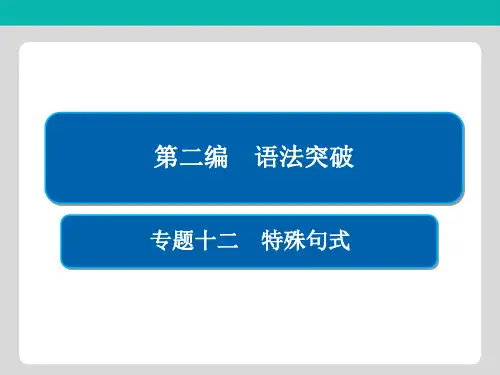
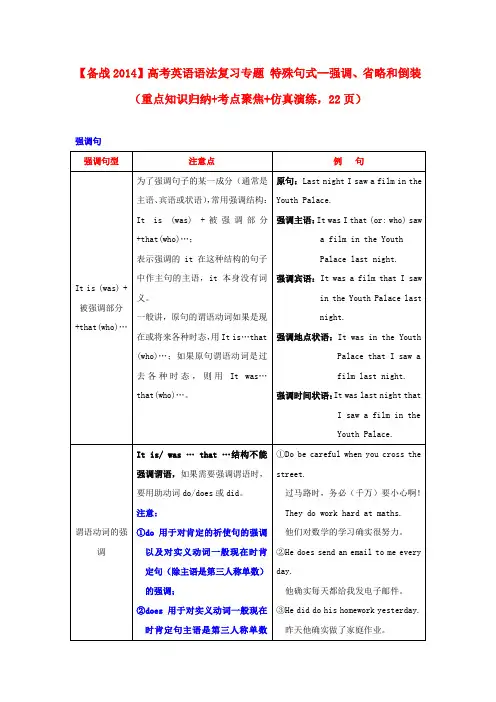
【备战2014】高考英语语法复习专题特殊句式--强调、省略和倒装(重点知识归纳+考点聚焦+仿真演练,22页)强调句强调句型注意点例句It is (was) + 被强调部分+that(who)…为了强调句子的某一成分(通常是主语、宾语或状语),常用强调结构:It is (was) +被强调部分+that(who)…;表示强调的it在这种结构的句子中作主句的主语,it本身没有词义。
一般讲,原句的谓语动词如果是现在或将来各种时态,用It is…that(who)…;如果原句谓语动词是过去各种时态,则用It was…that(who)…。
原句:Last night I saw a film in theYouth Palace.强调主语:It was I that (or: who) sawa film in the YouthPalace last night.强调宾语:It was a film that I sawin the Youth Palace lastnight.强调地点状语:It was in the YouthPalace that I saw afilm last night.强调时间状语:It was last night thatI saw a film in theYouth Palace.谓语动词的强调It is/ was … that …结构不能强调谓语,如果需要强调谓语时,要用助动词do/does或did。
注意:①do用于对肯定的祈使句的强调以及对实义动词一般现在时肯定句(除主语是第三人称单数)的强调;②does用于对实义动词一般现在时肯定句主语是第三人称单数①Do be careful when you cross thestreet.过马路时,务必(千万)要小心啊!They do work hard at maths.他们对数学的学习确实很努力。
②He does send an email to me everyday.他确实每天都给我发电子邮件。
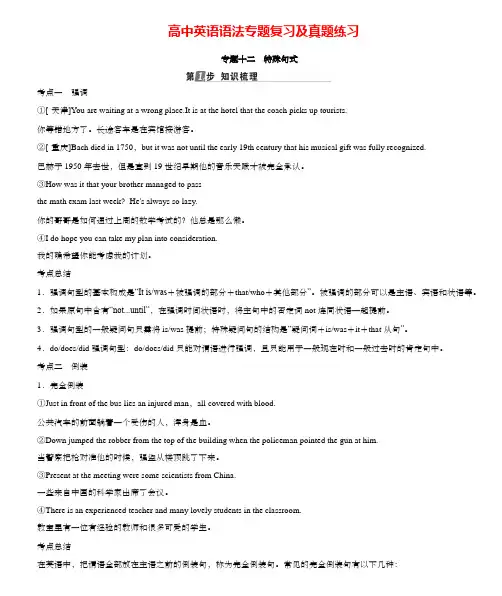
高中英语语法专题复习及真题练习专题十二特殊句式考点一强调①[·天津]You are waiting at a wrong place.It is at the hotel that the coach picks up tourists.你等错地方了。
长途客车是在宾馆接游客。
②[·重庆]Bach died in 1750,but it was not until the early 19th century that his musical gift was fully recognized.巴赫于1950年去世,但是直到19世纪早期他的音乐天赋才被完全承认。
③How was it that your brother managed to passthe math exam last week?He's always so lazy.你的哥哥是如何通过上周的数学考试的?他总是那么懒。
④I do hope you can take my plan into consideration.我的确希望你能考虑我的计划。
考点总结1.强调句型的基本构成是“It is/was+被强调的部分+that/who+其他部分”。
被强调的部分可以是主语、宾语和状语等。
2.如果原句中含有“not...until”,在强调时间状语时,将主句中的否定词not连同状语一起提前。
3.强调句型的一般疑问句只需将is/was提前;特殊疑问句的结构是“疑问词+is/was+it+that从句”。
4.do/does/did强调句型:do/does/did只能对谓语进行强调,且只能用于一般现在时和一般过去时的肯定句中。
考点二倒装1.完全倒装①Just in front of the bus lies an injured man,all covered with blood.公共汽车的前面躺着一个受伤的人,浑身是血。
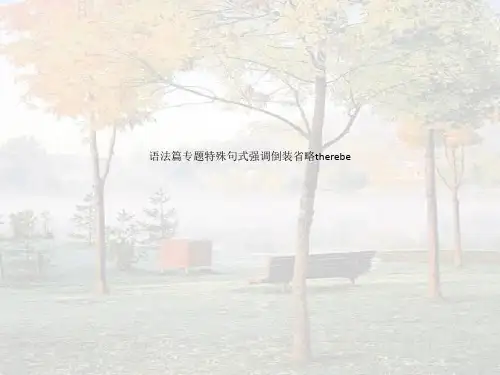
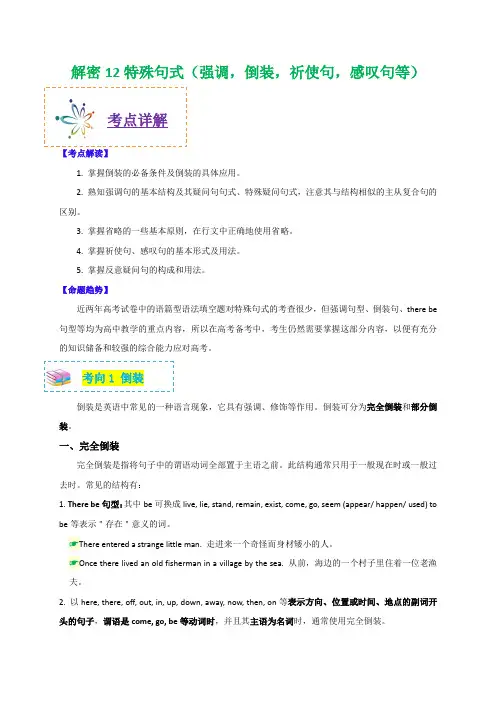
解密12特殊句式(强调,倒装,祈使句,感叹句等)考点详解【考点解读】1. 掌握倒装的必备条件及倒装的具体应用。
2. 熟知强调句的基本结构及其疑问句句式、特殊疑问句式,注意其与结构相似的主从复合句的区别。
3. 掌握省略的一些基本原则,在行文中正确地使用省略。
4. 掌握祈使句、感叹句的基本形式及用法。
5. 掌握反意疑问句的构成和用法。
【命题趋势】近两年高考试卷中的语篇型语法填空题对特殊句式的考查很少,但强调句型、倒装句、there be 句型等均为高中教学的重点内容,所以在高考备考中,考生仍然需要掌握这部分内容,以便有充分的知识储备和较强的综合能力应对高考。
考向1 倒装倒装是英语中常见的一种语言现象,它具有强调、修饰等作用。
倒装可分为完全倒装和部分倒装。
一、完全倒装完全倒装是指将句子中的谓语动词全部置于主语之前。
此结构通常只用于一般现在时或一般过去时。
常见的结构有:1. There be句型:其中be可换成live, lie, stand, remain, exist, come, go, seem (appear/ happen/ used) to be等表示"存在"意义的词。
☛There entered a strange little man. 走进来一个奇怪而身材矮小的人。
☛Once there lived an old fisherman in a village by the sea. 从前,海边的一个村子里住着一位老渔夫。
2. 以here, there, off, out, in, up, down, away, now, then, on等表示方向、位置或时间、地点的副词开头的句子,谓语是come, go, be等动词时,并且其主语为名词时,通常使用完全倒装。
☛Now, here goes the story. 现在,这个故事是这样的。
☛Then came another question. 然后又一个问题被提出来了。
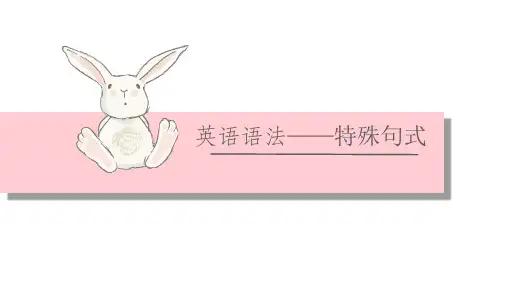

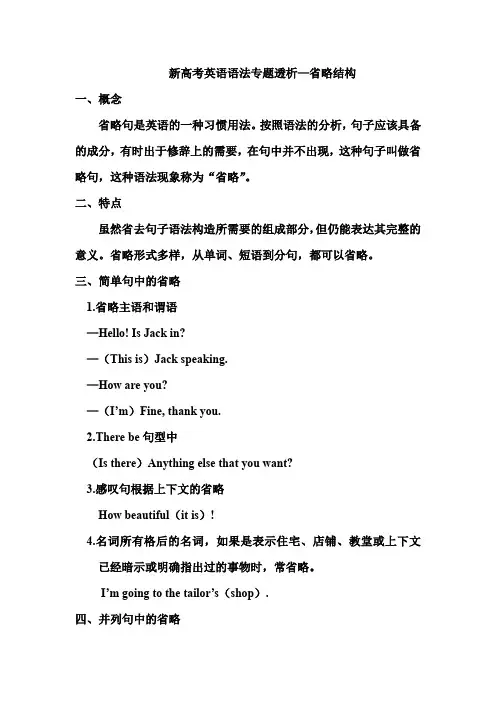
新高考英语语法专题透析—省略结构一、概念省略句是英语的一种习惯用法。
按照语法的分析,句子应该具备的成分,有时出于修辞上的需要,在句中并不出现,这种句子叫做省略句,这种语法现象称为“省略”。
二、特点虽然省去句子语法构造所需要的组成部分,但仍能表达其完整的意义。
省略形式多样,从单词、短语到分句,都可以省略。
三、简单句中的省略1.省略主语和谓语—Hello! Is Jack in?—(This is)Jack speaking.—How are you?—(I’m)Fine, thank you.2.There be句型中(Is there)Anything else that you want?3.感叹句根据上下文的省略How beautiful(it is)!4.名词所有格后的名词,如果是表示住宅、店铺、教堂或上下文已经暗示或明确指出过的事物时,常省略。
I’m going to the tailor’s(shop).四、并列句中的省略1.如果后面分句中有与前面相同的部分常被省略。
She is not fond of cooking, nor am I(fond of cooking).2.有时并列句中的省略部分出现在前面的分句中时,要看完最后一个分句才能掌握全句的完整意义。
Tom lives(in London), and John works in London.五、复合句中的省略1.宾语从句中的省略(1)由特殊疑问词引导的宾语从句中,若有与前面主句重复的内容,则可将重复内容省略,而只保留特殊疑问词。
You look upset. Can you tell me why?(2)在I think/I believe/I hope/I guess/I’m afraid等作答句,后面跟“so”与“not”分别等于肯定或否定时,宾语从句可省去。
—Do you believe he will pass the exam?—I believe so.(=I believe he will pass the exam.)—Do you think it will snow?—I hope not.(=I hope that it will not snow.)(3)在know/think/consider/suppose/find/believe/say/decide等动词后面所接的宾语从句中,连词that可以省略;若带有多个宾语从句,只有第一个that可以省略,其余的则不能省略。
![[荐]高考英语必考-特殊句式-省略句和强调句-详解](https://uimg.taocdn.com/fd7053cca216147916112829.webp)
高考英语必考-特殊句式-省略句和强调句-详解
一、特殊句式全家福
特殊句式这个大的考察方向,近几年,考察不多。
主要涉及到以下的考点。
一、感叹句(语法填空中考察,简单)
二、强调结构(语法填空,书面表达中考察,简单)
三、倒装句(语法填空,书面表达中考察,中等)
四、省略句(基本能力,直接考察不多)
五、祈使句(语法填空中考察某些结构)
六、反义疑问句(直接考察不多)
七、否定句(注意否定转移的现象,直接考察不多)
二、强调句
“It is/was…who/that…”强调句型是重要的句型之一。
此句型可强调主语、宾语、状语。
如果强调谓语时,用do/does/did+动词原形。
高考通常考查强调句与几个易混句型连词的使用和强调句的问句。
三、省略句。
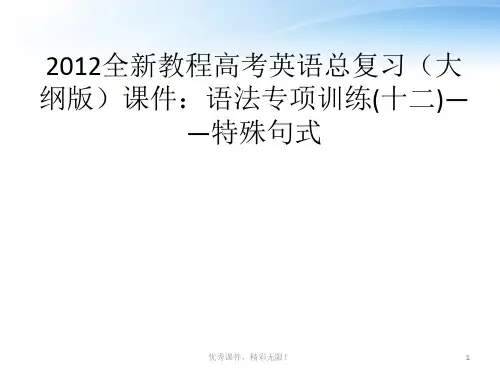
高考语法通关 十二、特殊句式(省略,倒装,强调)
1.(2012·衡阳模拟)Under no circumstances ________ my bike tomorrow. A.he is borrowing B.is he to borrow D..he will borrow could he be borrowing C解析:本题考查倒装。under no circumstances 放在句首的时候,后面用部分倒装。根据后面的时间状语tomorrow,可以知道选B项。 答案:B 2.(2012·信阳期中)In the far south ________ Stewart Island the largest of New Zealand's many smaller islands. A.lying B.lays D .lies C.lie 解析:本题考查倒装句。当介词短语in the far south放到句首的时候,后面用完全倒装,主语是Stewart Island,故选D项。 答案:D 3.(2011·南昌调研)________,his idea was accepted by all the people at the meeting. A.Strange as might is sound B.As it might sound strange C.As strange it might sound D.Strange as it might sound 解析:本题考查as引导的倒装。形容词+as+主语+谓语。故选答案D项。 答案:D 4.Every evening after dinner, if not ________ from work, We will spend some time walking with our parents. A.being tired B.tiring D.to be tired C.tired 解析:本题考查省略。句中“if not tired from work”实际上是“if we are not tired from work”的省略,为了避免与后句的重复,而tiring的主语是物。 答案:C 5.(2012·扬州检测)It was not unitl midnight ________ we finished the task. A.that B.when as .D while .C. 解析:本题考查强调句。去掉it was和空格后;句子仍然是一个完整的句子,故是强调句。 答案:A 6.(2012·宿州二模)________ she is not so cheerful. ________ she used to be? A.How is it that;as B.Why is it that;what D.How it if that;as C.Is it why;that 解析:考查强调句和状语从句。第一空是强调句的特殊疑问句部分;第二空为not so(as)...as固定句式。根据第二空的搭配可排除B、C两项;根据句意可知A项正确。句意为:她怎么不像以前那样高兴了? 答案:A 7.(2012·西安调研)—I don't know ________ makes her different from others. —Honesty, I think. A.how is it that B.how it is that D .what it is that C.what is it that 解析:考查特殊句式。上一句的意思是“我不知道是什么让她与众不同”,what it is that makes her different from others是know的宾语从句,因此要用陈述语序。从句是一个强调句,被强调部分是主语what。 答案:D 8.I don't know how many years ago ________ people began to stay at home and civilization began. A.it was when B.it was that D.C.was it that was it when 解析:考查强调句型。语意是:我不知道是多少年前人们开始呆在家中,文明由此开始。此句中被强调部分是how many years ago,去掉it was...that之后句子的正常语序是I don't know how many years ago people bagan to stay at home and civilization began。 答案:B 9.(2012·长沙月考)—________ made Daisy wild with joy? —Her success in the Alevel exam this year. A.How was it that B.When was it that D .What was it that Why was it that C.解析:考查特殊疑问句的强调句型。特殊疑问句的强调句结构为:特殊疑问词+be+it+that,根据语意,此处表示“什么东西让Daisy欣喜若狂?”强调what,故选D项。 D 答案: 10.Girls used to take fewer advanced match courses than boys but now they are taking just ________. A.as much B.too much D.C.as many too many 解析:考查形容词的比较等级和省略。本句补充完整为Girls used to take fewer advanced math courses than boys but now they are taking just as many advanced math courses as boys. 故C项正确。 答案:C 11.(2012·孝感模拟)They landed safely on the island in the Pacific. Everything went on better than ________. A.expected B.expecting D .to expect C.expectation 解析:考查省略句的用法。可以将than expected看成是that it was expected的省略。better than expected为习惯用法,表示“比预期的好”。 答案:A 12.Mary was only too ready to help others, seldom, ________,refusing them when they turned to him. A.if never B.if not D..if any if ever C解析:考查省略的用法。后半部分是对前半部分的进一步说明。句意为:玛丽总是乐于助人,如果有人向他求助,他很少拒绝别人。if ever“很少,难得”,符句意。 答案:D 13.(2012·莱州质检)________ the instructions on the packet when you take the drug and the drug, I think, will work soon. A.Follow B.To follow D.C.Following Followed 解析:考查祈使条件句。句意为:如果你服药的时候按照包装上的说明服用,我认为这种药会很快起作用的。此处的祈使句中含有when引导的状语从句。I think为插入语。此句实际上是“祈使句+and/or+陈述句”结构。祈使句中要用动词原形。 答案:A 14.(2012·阳泉期中)________ and the problem could be settled. A.A bit more effort B.To make more effort Making more effort .C. D.If you make more effort 解析:考查句式。句中有并列连词and,因此前面应该为祈使句。考查了“祈使句+and+陈述句”的句式。 答案:A 15.Not until the press reporsted the pollution ________ why the water supply had been cut off. A.people did know B.people had known D..had people known did people know C解析:考查倒装句和时态。Not until置于句首时,主句要用(部分)倒装结构,由此可以排除A、B两项;另外,根据reported可知C项时态不正确。 答案:D 16.(2012·汕头模拟)—We have to stop talking here outside. Listen, ________! —Hurry up, or we'll be late. A.there goes the bell B.there does the bell go D.goes the bell there .Cthere the bell goes 解析:考查倒装句。当here,there等表示方位的副词置于句首时,句子要倒装,且用全部倒装。